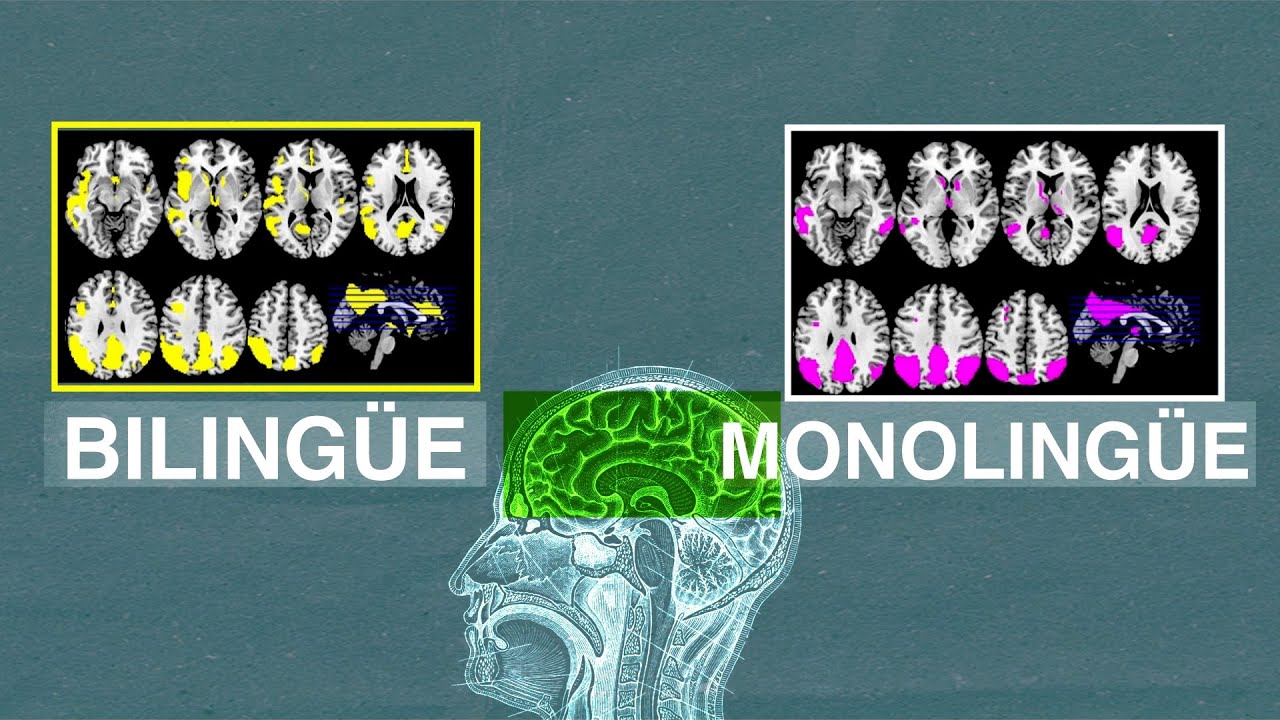The benefits of a bilingual brain - Mia Nacamulli
Summary
TLDRThis script explores the cognitive benefits of bilingualism, explaining how knowing multiple languages can impact brain function. It outlines the types of bilinguals and the critical period hypothesis, suggesting that childhood language learning involves both brain hemispheres, while adults may show less emotional bias in second languages. Bilingualism is associated with advantages such as increased grey matter density and delayed onset of neurodegenerative diseases. The script dispels past misconceptions about bilingualism and highlights its positive effects on brain health and cognitive function.
Takeaways
- 🌍 Bilingualism and multilingualism are common, with many people speaking more than one language.
- 🗣️ Language ability is measured in four aspects: speaking, writing, listening, and reading.
- 👶 Bilinguals can be classified into three types: compound, coordinate, and subordinate, based on how they acquired their languages.
- 👧 Gabriella, as a compound bilingual, learns two languages simultaneously with a single set of concepts.
- 👦 Her teenage brother might be a coordinate bilingual, learning English in school while speaking Spanish at home.
- 👨 Gabriella's parents are likely subordinate bilinguals, learning a secondary language through their primary language.
- 🧠 The brain's left hemisphere is more analytical, while the right is more emotional and social.
- 👶🧠 The critical period hypothesis suggests that children's brains are more plastic, allowing for easier language learning.
- 🧐 Adult language learners may show less emotional bias and a more rational approach in their second language.
- 🏋️ Multilingualism offers cognitive benefits, such as increased grey matter density and activity in certain brain regions.
- 🧠 Bilingualism can delay the onset of diseases like Alzheimer's and dementia by up to five years.
- 🔄 Bilinguals may have slower reaction times and more errors in cross-language tests, but this also strengthens executive functions.
Q & A
What are the benefits of being bilingual or multilingual according to the script?
-Being bilingual or multilingual can make it easier to travel, watch movies without subtitles, and it may also affect the way your brain looks and works, making it more efficient and possibly delaying the onset of certain diseases.
How is language ability typically measured?
-Language ability is typically measured in four parts: speaking, writing, listening, and reading.
What are the three general types of bilinguals mentioned in the script?
-The three general types of bilinguals are compound bilinguals, coordinate bilinguals, and subordinate bilinguals.
Can you explain what a compound bilingual is in the context of the script?
-A compound bilingual, like Gabriella in the script, develops two linguistic codes simultaneously with a single set of concepts, learning both languages as they begin to process the world around them.
How does a coordinate bilingual differ from a compound bilingual?
-A coordinate bilingual works with two sets of concepts, learning one language in school and continuing to speak another language at home and with friends, unlike a compound bilingual who learns both languages simultaneously.
What is the difference between a subordinate bilingual and the other two types of bilinguals?
-A subordinate bilingual learns a secondary language by filtering it through their primary language, unlike compound and coordinate bilinguals who learn languages in different contexts and at different times.
What does the script suggest about the brain's left and right hemispheres in relation to language processing?
-The script suggests that the left hemisphere is more dominant and analytical in logical processes, while the right hemisphere is more active in emotional and social functions, and both are involved in language processing.
What is the critical period hypothesis mentioned in the script?
-The critical period hypothesis is a theory that suggests children learn languages more easily because their developing brains' plasticity allows them to use both hemispheres in language acquisition, while in adults, language is usually lateralized to one hemisphere.
How does learning a second language in adulthood differ from learning in childhood according to the script?
-Adults who learn a second language may exhibit less emotional bias and a more rational approach when dealing with problems in the second language compared to their native language.
What cognitive benefits does being multilingual offer, as mentioned in the script?
-Being multilingual can offer benefits such as higher density of grey matter, more activity in certain brain regions when using a second language, and a potential delay in the onset of diseases like Alzheimer's and dementia.
What was the historical view on bilingualism before the 1960s, and how has it changed?
-Before the 1960s, bilingualism was considered a handicap that slowed a child's development by forcing them to distinguish between languages. However, modern research has shown that bilingualism offers cognitive benefits and strengthens certain areas of the brain.
How does the script describe the impact of bilingualism on the dorsolateral prefrontal cortex?
-The script describes that the effort and attention needed to switch between languages can trigger more activity in the dorsolateral prefrontal cortex, which plays a large role in executive function, problem-solving, and task-switching.
Outlines

This section is available to paid users only. Please upgrade to access this part.
Upgrade NowMindmap

This section is available to paid users only. Please upgrade to access this part.
Upgrade NowKeywords

This section is available to paid users only. Please upgrade to access this part.
Upgrade NowHighlights

This section is available to paid users only. Please upgrade to access this part.
Upgrade NowTranscripts

This section is available to paid users only. Please upgrade to access this part.
Upgrade NowBrowse More Related Video

367 Lecture 22.3 Types of Bilingualism

THE BILINGUAL BRAIN - Does speaking two or more languages make you smarter? | BENEFITS

Top 6 Benefits of Being Bilingual from Childhood: advantages of bilingualism and bilingual education

Qué pasa en el cerebro si hablas varios idiomas

What Happens To Your Brain When You Learn a New Language | Understanding with Unbabel

Why being bilingual is good for your brain | BBC Ideas
5.0 / 5 (0 votes)